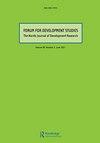Integrative and Exclusionary Roles of Trust in Timber Value Chain in the Southern Highlands of Tanzania
IF 1.1
Q3 DEVELOPMENT STUDIES
引用次数: 1
Abstract
Abstract Contract and trust are the two main governance mechanisms that influence actors’ integration into value chains. Nevertheless, most studies treat trust as a complement to formal contract, paying less attention on the circumstances in which trust becomes a sole mechanism of governance. The aim of this article is to examine how trust shapes integration in the non-industrial timber value chain in the Southern Highlands of Tanzania. Timber, which is the pillar of the districts’ revenue in the area, contributes significantly to the income of smallholder households. The study adopted an exploratory cross-sectional study design whereby data were collected mainly through in-depth interviews and focus group discussions with actors of the timber value chain. The findings showed that spot market and relational governance were the two main linkages in the timber value chain. Spot market linkage is characterized by absence or little trust, while some trust is present in relational linkage. In relational linkage, trust helps integration of actors in the value chain through enabling them access market information, capital in the form of credit, technology for processing timber, and coordination and collaboration among the actors. However, trust is associated with some challenges and to some actors, it plays an exclusionary role. The study recommends for the promotion of trust along with other social control mechanisms such as social knowledge in order to address these challenges.信托在坦桑尼亚南部高地木材价值链中的综合和排斥作用
摘要契约和信任是影响参与者融入价值链的两种主要治理机制。然而,大多数研究都将信任视为正式合同的补充,很少关注信任成为唯一治理机制的情况。本文的目的是研究信任如何影响坦桑尼亚南部高地非工业木材价值链的整合。木材是该地区各地区收入的支柱,对小农户的收入有很大贡献。该研究采用了探索性的横断面研究设计,主要通过与木材价值链参与者的深入访谈和焦点小组讨论来收集数据。研究结果表明,现货市场和关系治理是木材价值链中的两个主要联系。现货市场联动的特点是缺乏或缺乏信任,而一些信任存在于关系联动中。在关系联系中,信任通过使参与者能够获得市场信息、信贷形式的资本、木材加工技术以及参与者之间的协调与协作,帮助他们融入价值链。然而,信任与一些挑战有关,对一些参与者来说,它起着排斥作用。该研究建议与社会知识等其他社会控制机制一起促进信任,以应对这些挑战。
本文章由计算机程序翻译,如有差异,请以英文原文为准。
求助全文
约1分钟内获得全文
求助全文
来源期刊

FORUM FOR DEVELOPMENT STUDIES
DEVELOPMENT STUDIES-
CiteScore
1.80
自引率
14.30%
发文量
24
期刊介绍:
Forum for Development Studies was established in 1974, and soon became the leading Norwegian journal for development research. While this position has been consolidated, Forum has gradually become an international journal, with its main constituency in the Nordic countries. The journal is owned by the Norwegian Institute of International Affairs (NUPI) and the Norwegian Association for Development Research. Forum aims to be a platform for development research broadly defined – including the social sciences, economics, history and law. All articles are double-blind peer-reviewed. In order to maintain the journal as a meeting place for different disciplines, we encourage authors to communicate across disciplinary boundaries. Contributions that limit the use of exclusive terminology and frame the questions explored in ways that are accessible to the whole range of the Journal''s readership will be given priority.
 求助内容:
求助内容: 应助结果提醒方式:
应助结果提醒方式:


